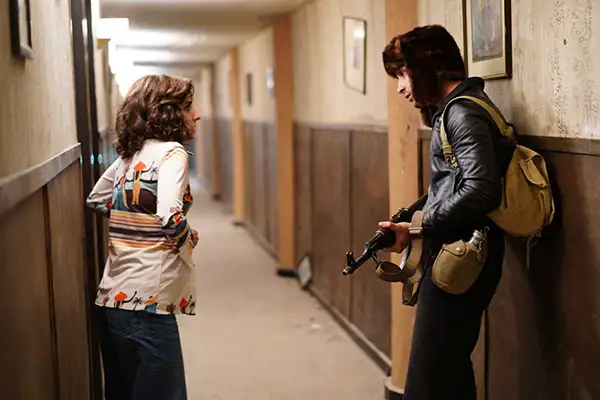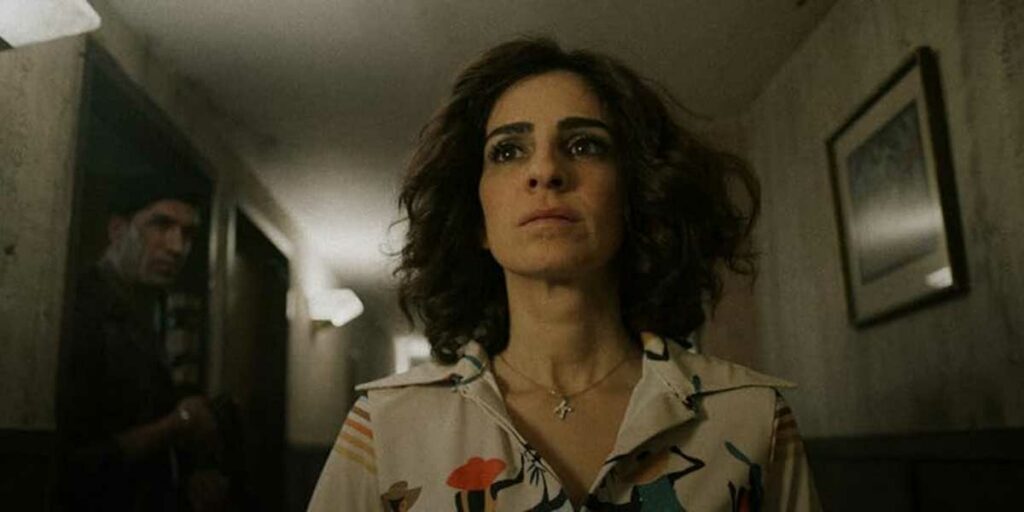Zohar Wagner’s Savoy mixes archival footage and reenactments to poignantly tell a survivor’s account of the 1975 Tel Aviv hostage situation.
The path to peace is long, fraught and bloody. The ongoing conflict in Palestine and Israel is complex, tragic and terrifying in equal measure, and Zohar Wagner’s Savoy is but a snippet of the turbulent history between the two. It’s a hybrid of archival footage and reenactments, telling a survivor’s account of the hostage situation that occurred in the Savoy Hotel, Tel Aviv, on the 5th of March 1975. In light of recent events, there’s a heartbreaking timeliness to it, and some viewers may find it distressing.
Wagner focusses Savoy around Kohava Levy (portrayed in the film by Dana Ivgy), an Israeli woman with the ability to speak both Arabic and Hebrew. Levy acted as a translator, after she was taken hostage alongside other hotel guests and staff by members of the Palestine Liberation Organisation, and her diary entries are the basis of every reenactment on screen. But as she was at the hotel for illicit reasons – spending the night with a lover while her husband and daughter were at home –, she faced public ridicule afterwards, with Time Magazine even going so far as to incorrectly label her a sex worker. Levy sued the publication, and won, but her reputation never recovered.
Savoy is an exercise in telling the story of a courageous, compassionate woman who was unfairly maligned in light of an incredibly traumatic experience, all because of a personal indiscretion. But it’s also a film that simply cannot be discussed without addressing the very prominent elephant in the room. The events on and since October 7th 2023 have had devastating effects on the region, with the heartbreak for all victims echoing around the world. The unintentional similarities to the events portrayed in Wagner’s film show the cyclical nature of violence and terror, and reinforce the urgent call for peace. Because it is unjust, unfair and inhumane for innocent lives to be the cost of such acts.

But the filmwas not intended, necessarily, to be a political statement. Savoy was intended to highlight the story of an unknown hero subject to misogyny and scorn after an event that irrevocably changed and ruined lives. It’s incredibly fast paced, coming in at a run time of just 78 minutes, and the structural decision to have it be a hybrid of both documentary and ‘fiction’ film means that it feels a little choppy. It positively speeds through the events of the night, specifying important moments with timestamps and soundtracking the whole thing with a mixture of archival sound recordings and readings of Levy’s diary. But while Wagner’s film, and the events depicted within, are certainly incredibly poignant and tragic, the speed does unfortunately mean that Savoy suffers from feeling a little detached at times.s
That’s not to say that it isn’t important, however, because one must remember the human element to all situations like these. Savoy comes at a time when the wounds of war are freshest, for both Israelis and Palestinians alike. It shines a light on a woman who deserved recognition for the part she played in defusing an incredibly tense situation, and points a finger at those who aided in her mistreatment after the fact.
But it is also a heartbreaking reminder that the region is still crawling down that path to peace. People are not their governments and all innocent lives deserve our compassion, regardless of what ‘side’ they are from. Wagner’s film may be a documentary-slash-dramatisation of a historical event, but its sentiment is still incredibly relevant today.
Savoy was screened at the UK Jewish Film Festival from November 11, 2023.

